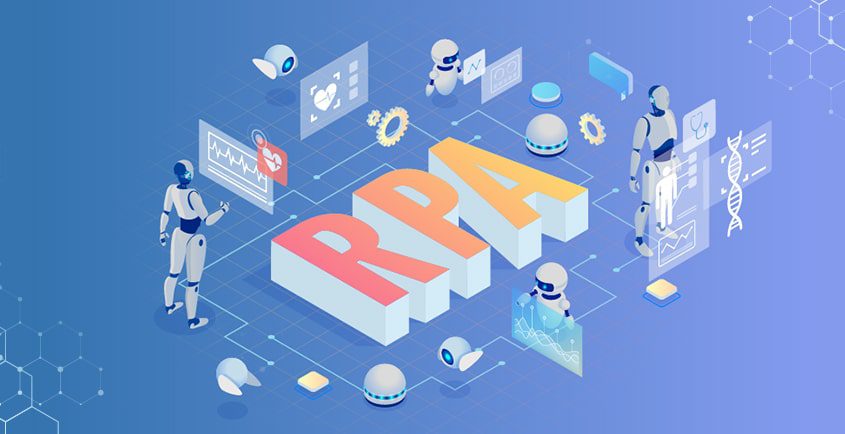RPA is an advanced, futuristic, and the most efficient technology that automates and streamlines the processes in a healthcare facility. In this blog, we will discuss some amazing ways of using RPA in healthcare.
The pandemic and the post-pandemic era have brought a wave of changes. It will be remembered as the pivotal point of change where all the industries revamped their way of functioning. Millions have turned their heads towards automation for effective and easier ways of working including the RPA applications in healthcare.
Healthcare organizations have been spearheading this transformation by producing vaccines at a rate never seen before. All this has been possible through the RPA use in healthcare that provided robust support throughout the processes. Obviously, the hard efforts cannot go unnoticed, but automation has played a vital role in transforming RPA use in healthcare.
Gartner estimates that by 2024, organizations will lower operational costs by 30% by combining automation with operational processes. Additionally, markets and markets say that the Robotic Process Automation (RPA) Market is estimated to reach USD 2,467.0 million by 2022, at a CAGR of 30.14%.
The RPA applications in healthcare are not only limited to robots, but its role goes beyond that. This blog outlines how automation can boost the healthcare industry and help them stay ahead of the curve in this competitive age.
What is RPA?
RPA is a software technology that builds, deploys, and manages software that mimics human actions while interacting with a digital system. The RPA systems can identify human actions like understanding screen movements, updating records, saving files, and more. It acts as a virtual worker that works effectively and frees up human resources. Using robots also eliminates the possibility of errors and minimizes the struggle with paperwork.
How Has RPA Emerged As a Core Feature in Healthcare?
When the hospitals are overburdened with cases that need immediate attention, action is required – fast. With the nurses and human resources being busy with saving lives, someone (or something) is needed to manage all the back-end tasks.
In such scenarios, RPA management makes a huge difference where it really mattered. The automation processes and management system kept the workers on the front line, reduced the waiting time, recruited experts, and supported procurement. All these factors can surely help the healthcare systems reform in the future.
Benefits of RPA in Healthcare
1. Scheduling and Managing Appointments
In a hospital scenario, scheduling patient appointments and managing them is one of the most tedious tasks. They are repetitive and involve resources as well.
Healthcare organizations can benefit from automating these tasks using RPA bots and other processes. These processes can interact with the patients, give them solutions for the query, schedule, change, or update appointments as required.
2. Managing Data and Records
The healthcare industry deals with a massive amount of data on a daily basis. Burdening useful resources with the paperwork of managing data can hamper the productivity of the resource. It helps regulate and maintain the record, RPA use in healthcare offers accuracy, quick response, data security, and consistency. Robotic software can also be customized to comply with the protocols and rules set by the government of the organization.
3. Reducing Administrative Costs
The healthcare sector is one of the biggest employers which also raises the cost of the company. The employee welfare funds, salaries, and other incentives can be a burden. With RPA software in place, the organization or hospitals can reduce employee requirements and cut down on administration cost by automating repetitive manual tasks.
4. Enhancing the Patient Experience
Being a robot-based software with the capabilities of quick decision-making, RPA management can provide more consistent care. Because of accurate decisions, quick replies, reduced costs, and greater visibility across the entire patient record, RPA can provide a better patient experience than any human.
5. Infection Control and Maintenance
Infection control protocols are a basic necessity of every healthcare unit. RPA can be used for executing quick and monitored infection control protocols. Including
- Screening of the patients by including regulatory compliance and CDC protocols
- Managing priority tasks and setting up the sequence of actions
- Tracking patient care plans and sending alerts to the authorized staff based on patient data thresholds
- Regulating the cleaning schedules and maintaining the records
6. Claims Management:
Reimbursement, cashless facilities, and claim settlements are a part of everyday work in a healthcare organization. With the help of RPA and AI healthcare can effectively manage claims processing. The process includes acceptance, communication, resubmission, and cost predictions based on history.
Invest Use of RPA in Healthcare for Organization Growth
Gartner estimates that by the end of 2022, 85 percent of organizations will deploy RPA software and the healthcare industry can benefit from RPA the most. The efficacy and uses of the RPA are worth the investment and can help your organization.
SVAM International can help you discover the power of automation with our RPA solutions that aim to grow your business by blending RPA with AI and ML. Our subject matter experts assess your company’s readiness, develop a prototype, and finally build and assemble the RPA to your system.



